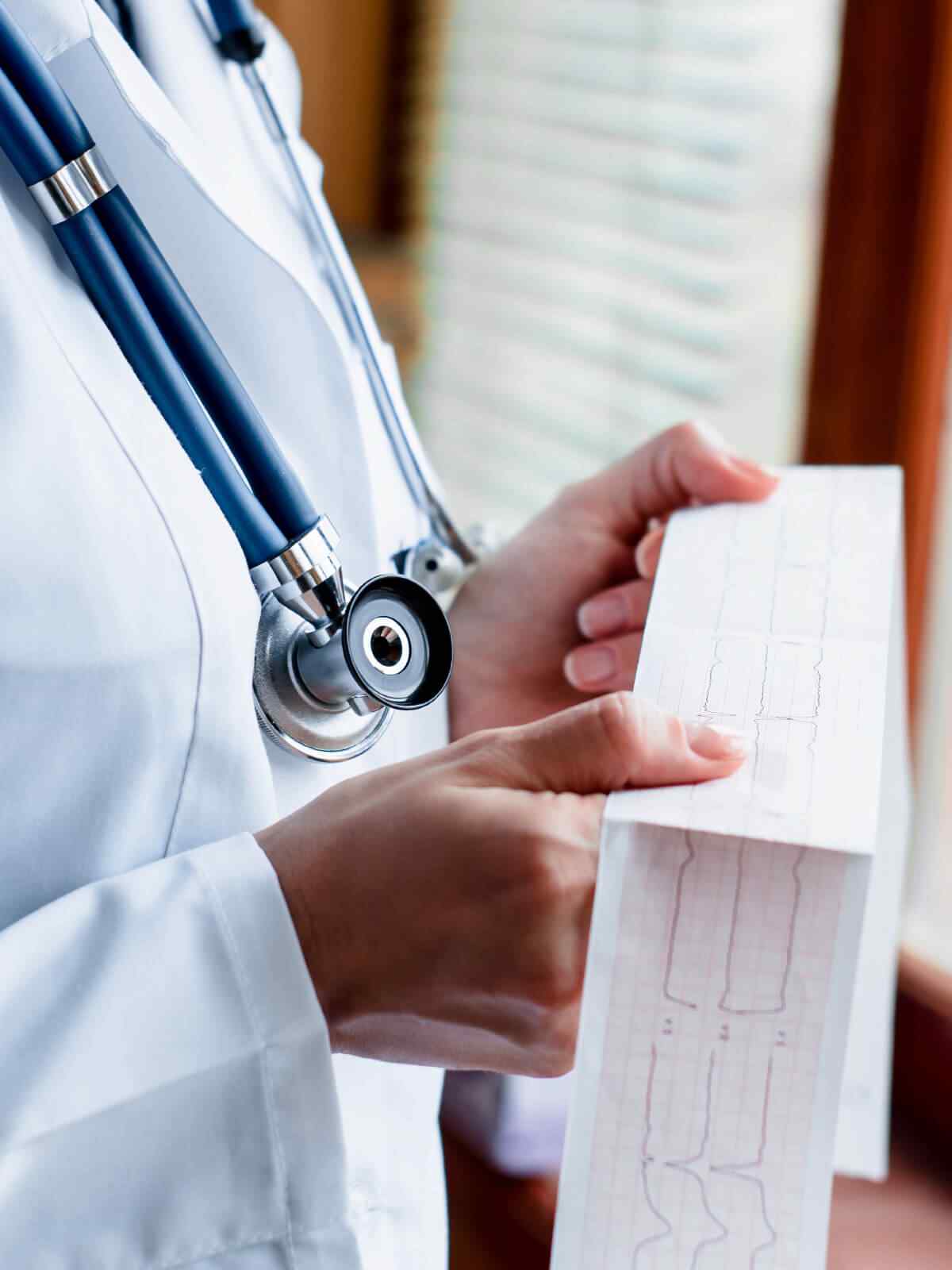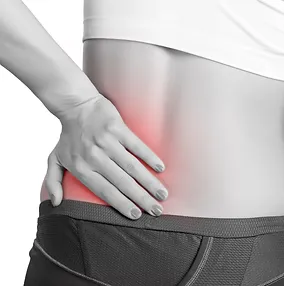Herniated Lumbar Disc
with Radiculopathy

One of the most common causes of lower back pain is a herniated lumbar disc. When it occurs, it can also pinch a nearby nerve, leading to radiculopathy. A herniated lumbar disc with radiculopathy can make even your simplest of daily tasks painful and severely impact your quality of life.
What is it?
The lumbar spine is an incredibly mobile and active part of the body, moving freely in six different directions. There are five vertebrae in the lumbar spine. Each are connected to the other by four joints and separated by intervertebral discs.
These discs themselves have two parts:
-
Annulus fibrosus: The tough, flexible outer ring of the disc
-
Nucleus pulposus: The soft, gel-like center of the disc
These discs provide protection and allow easy movement of the vertebrae. They also keep pressure off of the nerves in the spinal column. A herniated lumbar disc with radiculopathy is a condition where the disc has burst and the nucleus pulposus has partially or completely leaked. This results in pressure on spinal nerves and a very specific type of pain that radiates out from the lumbar spine: radiculopathy.
Herniated discs are also sometimes referred to as slipped or ruptured discs, but they are not the same as a bulging disc. Bulging discs extend or protrude outwards, but they are still intact.
Unless it is caused by trauma or an accident (see more causes below), lumbar herniated disc symptoms may be subtle and slow to appear.
In the early stages, you may notice that when you sit or stand for prolonged periods of time your back becomes sore. You might also find that there is pain across your buttocks or down the outside of your hip. This usually occurs on just one side or the other.
As pressure on the nerves increases and the condition progresses, you may find yourself with more severe symptoms.
Lumbar radiculopathy is most commonly experienced as sciatica. The sciatic nerve is the longest and widest nerve in the body, originating in the lumbar spine and traveling across the buttocks, down the hip, and down the legs.
Sciatica comes with a host of debilitating symptoms, including:
-
Pain that is hot or burning
-
Electrical like “shocks” of pain
-
Numbness or weakness in the legs
-
Pain that gets more severe with prolonged sitting or standing
-
Inability to sit or stand comfortably at all
-
Tingling, or “pins and needles” sensations
-
Sensitivity to touch
If herniated lumbar disc with radiculopathy remains untreated, eventually the person with this condition will be unable to participate in their daily activities without extreme pain. This can also lead to cauda equina syndrome. This is a serious condition most often first recognized by the loss of bowel or bladder control. If you’re experiencing this symptom, get immediate, emergency medical treatment.
In addition to trauma or injury (i.e., a car accident or sports injury), herniated lumbar disc causes are most often associated with normal, age-related wear and tear that results in gradual disc degeneration. Degenerative disc disease is an accelerated version of this wear and tear. It can occur in younger patients, but most often occurs in patients over the age of 60.
There are risk factors that can increase your chances of developing herniated discs (or that accelerate the wear on your spine in general). These include:
-
Occupational hazards: Jobs that require repetitive heavy lifting or twisting in the spine increase the chance of injury and the pace of wear
-
Weight: Patients who are overweight have additional stress on all of their joints, including the ones in their spine
-
Prolonged periods of sitting: Remaining seated for long periods of time can place extra pressure on your lumbar spine
-
Smoking: Smoking decreases oxygen in the body and can accelerate disc degeneration
-
Gender: Men between the ages of 20 and 50 are most likely to herniate a disc for reasons other than normal wear and tear
Getting plenty of exercise, quitting smoking, and maintaining a healthy body weight are all good ways to decrease your chances of experiencing a lumbar herniated disc with radiculopathy.
Lumbar herniated disc with radiculopathy treatment starts with lifestyle and non-invasive interventions. This may include adding exercise or physical therapy to strengthen the muscles that support your spine and core. In some cases, injections can also help minimize pain so that patients can undergo physical therapy.
If more conservative treatments fail and your pain is severe, your doctor may recommend one of the following lumbar herniated disc surgeries.
SPINAL CORD DECOMPRESSION SURGERY
When the intervertebral disc is injured or otherwise damaged, spinal cord decompression opens up the space between the vertebrae to relieve painful pressure on the sciatic nerve.
At the same time, your surgeon may perform spinal fusion for increased stability.
POSTERIOR LUMBAR INTERBODY FUSION
Posterior lumbar interbody fusion is a procedure that addresses radiating back pain involving damaged intervertebral discs.
Your surgeon removes the injured or dysfunctional disc. The disc is replaced by a bone graft and a metal cage that is further stabilized with screws or rods. A posterior lumbar interbody fusion is performed with a smaller, less invasive incision in the back of the body.
LUMBAR LAMINECTOMY WITH NERVE ROOT DECOMPRESSION
The back of each vertebra has connective tissue that covers and protects your spinal canal. This is called the lamina.
A lumbar laminectomy removes this lamina to relieve pressure on your nerves and spinal cord. This decompression can ease chronic, excruciating back pain when other more conservative treatments have been unsuccessful. This may also be accompanied by a spinal fusion when appropriate.
How We Can Help.

Approach
When a clinical exam reveals a diagnosis of herniated lumbar disc with radiculopathy, it’s time to get help for your pain. Dr. Rosenstein and the dedicated team at North Texas Neurosurgical Consultants are based in Dallas/Fort Worth area but welcome patients from all over Texas.
If you’re ready to work with one of the top neurosurgeons in Texas, contact us today 817-467-5551. We look forward to helping you.
